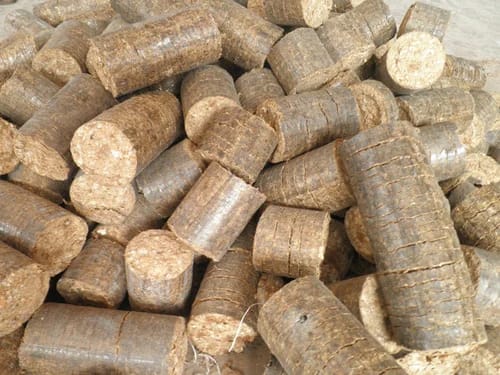A Biomass Briquette, also known as bio briquette or renewable briquette, is a form of solid biofuel made from organic materials. These briquettes are produced by compacting biomass residues such as agricultural waste, forest residues, sawdust, and other biomass materials. Visit: Briquette Machine
Here is an overview of biomass briquettes and their key characteristics:
Production Process
Biomass briquettes are typically produced through a process called briquetting. The biomass materials are shredded and dried to reduce moisture content. They are then compressed under high pressure without the use of any binding agents. The resulting briquettes are dense and have a consistent shape and size.
Renewable Energy Source
Biomass briquettes are considered renewable energy sources because they are made from organic materials that can be replenished. They offer an alternative to fossil fuels and contribute to reducing greenhouse gas emissions and dependence on non-renewable energy sources. Explore: Briquetting Plant in India
High Energy Density
Biomass briquettes have a high energy density, meaning they contain a significant amount of energy per unit volume or weight. This makes them efficient for energy production and reduces the storage space required to be compared to raw biomass materials.
Environmental Benefits
Using biomass briquettes as a fuel source has several environmental benefits. First, they help reduce the emission of greenhouse gases, including carbon dioxide, when compared to burning fossil fuels. Second, they provide a way to utilize agricultural and forestry residues, reducing the need for their disposal through burning or other means, which can cause pollution and environmental degradation.
Versatile Applications
Biomass briquettes have a wide range of applications. They can be used in industrial boilers, power plants, and heating systems for residential and commercial purposes. Biomass briquettes can also be used as a substitute for traditional charcoal in cooking and as a source of heat for cooking and heating in developing regions.
Cost-effective and Sustainable
Biomass briquettes are generally cost-effective compared to other fuel sources, especially in areas where biomass resources are abundant. The use of biomass residues for briquette production also adds value to agricultural and forestry waste materials, making the process economically viable and sustainable.
Carbon Neutral
When biomass briquettes are burned, the carbon released is roughly equivalent to the carbon absorbed during the growth of the biomass. This makes biomass briquettes a carbon-neutral fuel source, contributing to the reduction of net carbon emissions and combating climate change.
In conclusion, biomass briquettes are a renewable and sustainable form of solid biofuel produced from organic materials. They offer numerous environmental, economic, and social benefits, including reduced greenhouse gas emissions, efficient energy production, versatile applications, and utilization of biomass residues. With their high energy density and carbon-neutral properties, biomass briquettes play a vital role in transitioning towards cleaner and more sustainable energy sources.
Read More: Overview of Fabrics
